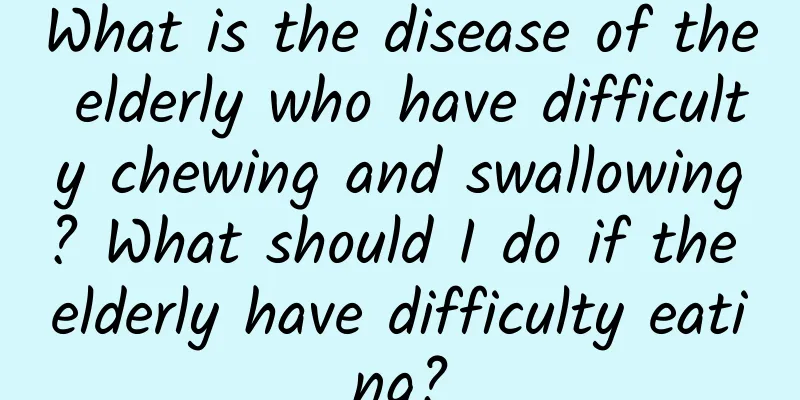What is the disease of the elderly who have difficulty chewing and swallowing? What should I do if the elderly have difficulty eating?

|
As the elderly age, their body functions will deteriorate, and taking care of them requires more patience. Some elderly people even have difficulty chewing and swallowing, which is actually a symptom and still requires careful care. What is the disease that makes the elderly unable to chew and swallow?Chewing disorder refers to the difficulty in cutting, mashing and grinding food in the mouth by relying on teeth, chewing muscles, etc. Dysphagia refers to the obstruction of food from the mouth to the stomach and cardia during the eating process, resulting in a feeling of obstruction in the pharynx, behind the sternum or in the esophagus. Elderly people may experience chewing disorders or dysphagia due to oropharyngeal diseases, esophageal diseases, neuromuscular diseases or other systemic diseases, which may affect their eating. What to do if the elderly have difficulty eatingDepending on the severity of chewing disorders or dysphagia, foods with different properties can be selected. If the elderly have mild dysphagia, it is recommended to choose staple foods that have been steamed or boiled to soften, leafy vegetables and eggplants that are easy to cook and soften, softer fruits, boneless fish, boneless poultry and livestock meat, ground soy milk and nuts. Avoid eating fried foods, foods with large and hard particles, and root vegetables containing crude fiber. If the elderly have moderate chewing disorders or mild dysphagia, they should choose to eat semi-liquid foods, such as dairy products, soft and mushy noodles, steamed and soft boneless and thornless meat, leafy vegetables, etc. If the elderly have obvious swallowing difficulties, they should choose pureed food. They can first steam and cook the appropriate ingredients until they are soft, then use a blender to process them into a puree before eating. What to do if the elderly don't like to drink water or eat1. Exercise moderately, which can consume some water and make you feel hungry and thirsty. 2. Drink tea and chat. You can unconsciously drink more tea while chatting. 3. Meals are served with soup or porridge. You can add your favorite food to the soup or porridge according to the elderly’s taste. 4. Communicate more and receive attention to make the elderly happy |
<<: Can you still eat rotten fruits? What is the reason why fruits are prone to rot?
Recommend
This thing that represents health actually deprives women of their right to be mothers
Nowadays, whole grains are becoming more and more...
When will the barbershop open during the epidemic? What should I do if I need a haircut during the epidemic?
Did your hair grow wildly during the epidemic? It...
Why do women urinate frequently at night?
Frequent urination in women is a disease. There a...
Will fibroids still grow after menopause?
There are many causes of uterine fibroids. The mo...
How to choose pig's trotters? How to make delicious braised pig's trotters
I believe that when it comes to pig's trotter...
How to prevent fetal arrest when preparing for pregnancy after fetal arrest
For female friends, pregnancy is a great joyous e...
How to solve vaginal itching?
The phenomenon of female genital itching is now v...
Where should women soak their feet?
Foot soaking is foot massage, which is one of the...
Can I drink coffee during confinement?
Confinement after childbirth is a tradition uniqu...
The amazing effect of a woman putting it in her mouth
Many people are prone to gum inflammation and pai...
Is there an age limit for Down syndrome screening?
Nowadays, many mothers are older and they become ...
Can a woman who has had a vasectomy still have the surgery done?
In the past, women had to undergo sterilization a...
Why do we need to do urine tests? How do elderly people in wheelchairs cope with urine tests?
Author: Zhang Yingqi, Chief Physician, First Hosp...
How is gynecological effusion formed? What causes gynecological effusion?
As a woman, gynecological diseases are commonplac...









